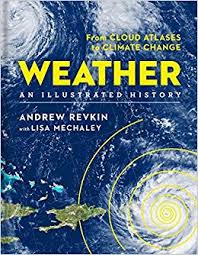As it is with humanity, the same holds true for the weather. This week, weather celebrates its 101st moment – the release of Andy Revkin and Lisa Mechaley’s collaboration, Weather, an Illustrated History: From Cloud Atlases to Climate Change. The book chronicles, in crisp text and art, a series of vignettes on weather’s top 100 moments, spanning nearly five billion years.
A great read – fanciful and fun – and at the same time profound and thought-provoking.
We’re reminded that the Earth’s first order of business (moment#1) was cloaking itself in an atmosphere, and as soon as possible (moment#2), adding water. Takes a while, but eventually (moment#11), weather gains a human audience, and that audience is literally moved by the experience (100,000 BCE Climate Pulse Propels Populations). It’s not long before the audience enters the action (moment#15); agriculture warms the planet ca. 5,000BCE.
Keep reading (actually the path of least resistance – the experience is not unlike that encounter with a bowl of popcorn – it’s easier to keep going than to stop)! You’ll find all your favorites. The great atmospheric events – medieval warmth and the little ice age, cooling in response to volcanic eruptions, great hurricanes and storms, awesome floods, and more. The great human accomplishments – weighing the atmosphere, deciphering the rainbow, harnessing wind power, making useful forecasts, modifying the weather, and laying the foundation for geoengineering. The unintended human consequences, starting with that agriculturally-triggered warming, extending to acquired vulnerability to extreme weather and solar storms, the current global warming, Arctic sea-ice retreat (moment#97), and coral reef die-offs (moment#99). A closing conjecture about an end to the ice ages (moment#100) responsible for so many of the first 99 moments.
It’s all there – and more.
The book is a page turner. Savor the experience. But don’t fool yourself. Weather: an Illustrated History is no mere inventory. What elevates it to moment #101? Just this: Revkin and Mechaley have framed the early chapters of a suspense thriller. Will humanity, now a major actor on the world stage – be the hero or the villain of the piece? Will we consciously comprehend the growing impacts of our acquisition of natural resources, our efforts to cope with hazards, and our unthinking environmental despoliation? Will that awareness drive us to harness our new technological capabilities and social networking tools with will and vision sufficient to change our current course, making it more sustainable? Most fundamentally, can seven billion of us master our common spiritual challenge? That is, can we overcome our tendencies to resent, factionalize, and polarize, and instead build the trust, the vision, and the common purpose we need to move forward?
So – buy and read the book! You’ll be glad you did. But don’t stop there. Let the experience carry you forward; take another step toward personally creating or identifying weather-moment #102. Play your part in moving that and the succeeding moments, yet to come, in a positive direction.


Bill:-
Great questions! Let me consider your most fundamental – “can seven billion of us master our common spiritual challenge?”
I think the answer has to be “NO.” We may globally have some values in common, but our application of those common values depends on our individual contexts, the perceived challenges we face. Too many in the developed world seem to think that everyone sees the world the same way they do. In our country while poverty has not been eradicated, a safety net exists for almost everyone. In the developing world, extreme intergenerational poverty is for many the overriding challenge: it’s hard to worry about the environment while carrying a child too weak from hunger to walk. And who are we to say that they are wrong?
Rather than trying to mobilize us all to tackle the same challenge, I prefer taking the long view. History has shown that even civilization itself depends on rising far enough above poverty to have the discretionary resources to apply to things that go beyond bare subsistence. History should also have taught us that there never are enough resources to do everything, i.e., even in the richer First World, we have to make choices; we have to prioritize; we have to find a balance between today’s needs and tomorrow’s threats and opportunities. Our selfish interests will always play a role in those choices, but we have to hope that our values – the better angels of our nature – will play a bigger role.
So I see a much less linear path forward. Those who are poor brought out of their poverty; those who are richer doing what they can to help them and to maintain as best they can stewardship of our planet. Again, for those of us privileged to live in our great country, we will continually have to choose, prioritize and balance. If, as economists are telling us, there isn’t enough money to ensure a safety net for our elders in the future, then that will have to be added to the scales as we seek that balance. Aristotelian balance may be boring, but it’s past time for all of to recognize its absolute necessity.